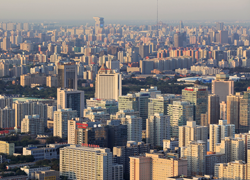
One of the most frequently levied criticisms made against China is that its development, while economically impressive, is environmentally disastrous. Judge Xue addressed this criticism directly by providing the demographic and economic context underlying China’s development, briefly outlining China’s history as it relates to sustainable development, and arguing that the Chinese government is indeed actively promoting sustainable development. According to Judge Xue, the international community should recognize China’s progress with regards to sustainability and appreciate the fact that due to its size and current pace of economic development, such progress is necessarily slow in the making.
Judge Xue stressed that one must think about Chinese sustainable development in relation to its extraordinary demographic and economic circumstances. China has a population of 1.34 billion people and an economy that has been growing at a rate of ten to twenty percent for the last decade. It has twenty percent of the world’s population and only seven percent of the world’s arable land. As such, it makes little sense for the international community to hold a country like China to the same standards to which it holds countries that have been developed for decades and have already acquired the capacity to provide for the needs of its citizens. Furthermore, it is unrealistic to expect China to turn on a dime and improve its environmental record overnight. China’s history shows that it takes sustainable development seriously, but that under no circumstances will it sacrifice the economic wellbeing of its citizenry to satisfy the west’s environmental goals.
China’s history of environmental regulation, according to Judge Xue, suggests that it is serious about sustainable development and the protection of the environment. In 1984, China set up the Environmental Protection Administration – the first organ of the PRC meant to deal with issues of sustainability. However, during the 1980’s, sustainable development was equated with economic development and the focus of the Administration was to keep land healthy for farming. The broader effects of environmental degradation were seen as a mere growing pain. Thus, China pursued labor-intensive industries to attract foreign investment. Those who wanted cheap labor and lax environmental regulations came to China.
This led to a set of policies that caused terrible pollution, acid rain, water contamination, accidents that damaged fisheries, and various other consequences that were destructive to the lives and livelihoods of millions of Chinese people. Starting in the mid-1990’s, China revised its environmental laws to provide for more concrete rules and supervisory mechanisms.
Today, The People’s Republic of China now has a fairly comprehensive legislative regime that touches on water pollution, air pollution, solid waste, and radiation. Judge Xue made it a point to state that China made the change from irreverence toward to respect for the environment not for the international community, but for the Chinese people who had suffered as a result of pollution.
Today, China is a state party to about 50 environmental treaties and abides by them in good faith. To help it live up to its environmental treaty obligations, the Chinese government came up with the concept of “Green GDP,” which takes economic and environmental factors into consideration and helps the government make decisions with an eye towards their environmental impact. The use of Green GDP has already led to a significant improvement to China’s desertification problem. Additionally, China recently published its “Agenda for the 21st Century,” which contains twenty chapters and 78 concrete program areas and places sustainability at the heart of its development strategy. In 2005, a chemical factory exploded leading to trans-boundary water pollution on China’s border with Russia. Both states took cooperative measures to save downstream areas from water pollution. In 2006, China sought to reduce its emissions by twenty percent by the year 2010, and it met that target. These concrete steps show that China takes sustainable development seriously and is committed to improving its record in the future.
All this has led to an increase in public participation in environmental assessment. If a building plan is going to cause harm to individuals as a result of its environmental impact, the Planning Department has a duty to hold public hearings, which will lead to a change of plans if the environmental costs are unnecessary or outweigh the economic benefits.
China sees sustainability both as an end in itself and as a means of achieving broader societal goals. It will continue to seek a balance between economic and ecological development, keeping in mind current environmental standards. Judge Xue made it clear that China will do so not because sustainable development is a goal that the international community has for China, but because sustainable development is the only way for the Chinese government to provide for its citizens in the long term. Judge Xue would have international community recognize the progress China has made in the past and have patience with the development it is to make in the future.


